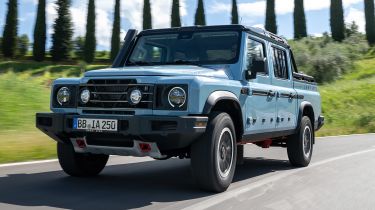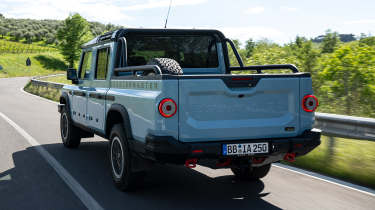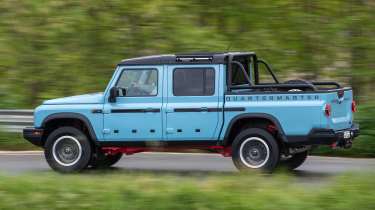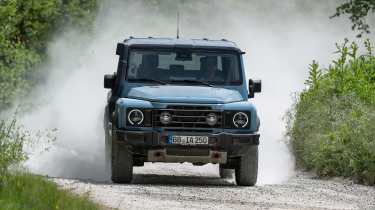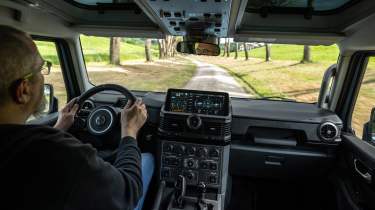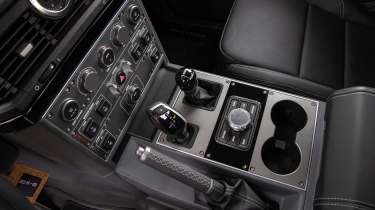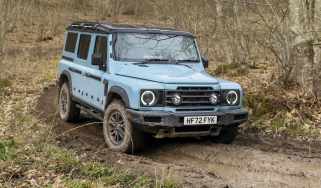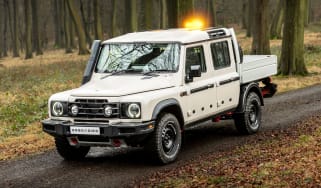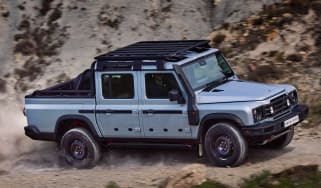Ineos Grenadier Quartermaster pick-up review
Adding a bed to the company's go-anywhere Grenadier 4x4 comes with compromises

The Ineos Grenadier Quartermaster takes the formula established by the Grenadier and adds a pick-up truck load bed, but the nature of the UK's commercial vehicle space means that it's only ever going to be a niche choice here. It's more of a 4x4 with an open load area than what we would call a pick-up, but there will be buyers out there that will find its unique combination of outstanding off-road ability and practicality ideal - as long as they can afford it.
Our choice: Ineos Grenadier Quartermaster 3.0 Diesel Utility
About the Ineos Grenadier Quartermaster
With the Ineos Grenadier, the company marked out its intention to build a go-anywhere 4x4 that was a spiritual successor to Land Rovers of old - something that company founder Sir Jim Ratcliffe felt that the current Defender failed to achieve. Now the company is expanding its offering, by creating the Grenadier Quartermaster pick-up truck.
If you hadn't already surmised from its name, the Quartermaster is a body variation of the existing 4x4. And from the nose to the trailing edge of the rear doors, the Quartermaster looks identical to the 4x4 model. The changes at the rear include an extended wheelbase measuring 3,227mm – up by 305mm – while an open pick-up bed has been added that takes the car's overall length to 5,440mm, so the Quartermaster is longer than a Ford Ranger.
Used - available now

2024 Vauxhall
Mokka Electric
45,109 milesAutomaticElectric
Cash £12,995
2021 Vauxhall
Mokka Electric
14,731 milesAutomaticElectric
Cash £13,990
2016 Nissan
Qashqai
67,008 milesManualDiesel1.5L
Cash £9,995
2023 Vauxhall
Combo Life
22,563 milesManualDiesel1.5L
Cash £16,495Unlike with the 4x4, there's just one body configuration on offer, which is a conventional double cab with four doors and five seats inside. The main focus of the Quartermaster is its cargo area, which features a drop-down tailgate and is large enough to carry a single Euro Pallet, much like rival pick-up trucks. However, a payload of 835kg is more in line with commercial 4x4s than the current crop of pick-ups, which can carry more than a tonne of payload to qualify as commercial vehicles for tax purposes. A towing weight of 3.5 tonnes means the Quartermaster can match the best tow cars on the market.
The rest of the Quartermaster experience mirrors the 4x4's, with a standard Utility Wagon at the entry point to the range that can be customised with a number of bespoke add-ons. Above that are rugged Trialmaster and plusher Fieldmaster models that offer extra kit inspired by clothing manufacturer Belstaff (also part of the Ineos empire), although both can be upgraded with Rough and Smooth packs.
The Quartermaster's running gear is carried over from the Grenadier, too, so you get a choice between petrol or diesel 3.0-litre in-line six-cylinder engines sourced from BMW, an eight-speed ZF automatic gearbox, Brembo brakes, a central transfer case from specialist firm Tremec, Eibach springs, Recaro seats (depending on spec) and BF Goodrich All-Terrain tyres. As with the Grenadier, the Quartermaster is built at Ineos's factory in Hambach, France, with assembly overseen by Magna. Outsourcing everything like this has helped Ineos come to market quickly, and means there are plenty of tried-and-tested components that should help to ensure reliability.
Unfortunately, all of this kit comes at a price that starts on the wrong side of £60,000. The entry level Quartermaster Utility Wagon adds around £1,200 to the price of the base Utility Wagon version of the Grenadier 4x4, while the Trialmaster and Fieldmaster variants are around £7,000 on top of that. It means the Quartermaster is around £7,000 more expensive than a Ford Ranger or Toyota Hilux, two models that can be had for even less if they are bought as commercial vehicles.
MPG, CO2 and running costs
If you think the price is right for the Ineos Grenadier Quartermaster, then its running costs are unlikely to raise an eyebrow. Official fuel economy is the same for the pick-up as it is for the standard 4x4, although a quoted maximum of 19.6mpg for the petrol model and 25.2mpg for the diesel aren’t anything to write home about.
Thanks to its ineligibility as a commercial vehicle, tax costs will be based on the Quartermaster’s emissions, and with figures ranging from 286g/km to a whopping 336g/km, tax bills are going to be hefty for company car users.
As well as having a high list price, Ineos offers a wide range of options and accessories that allow buyers to customise their Quartermasters to their specific needs. There are side runners (an essential addition if smaller people are going to gain access to the cabin), light bars, winches and a roof rack which can be upgraded with mounts for bikes, spare wheels, jerry cans, kayaks and much more.
Load space and practicality
The main change between the Grenadier 4x4 and the Quartermaster is the addition of the open load bed at the back, but this is also the point at where the Quartermaster doesn’t make as much sense as the 4x4. While the load area is big enough to accommodate a Euro Pallet, the spare wheel is mounted on one side of the space, and this needs to be removed before you can think about loading a pallet on board. If you’re going to use the Quartermaster for its intended off-road purpose, would you really venture into the great outdoors without a spare wheel?
The load area itself features a lining to protect the paintwork, four lashing eyes set into the floor and a 400 watt power take-off. The tailgate hinges down to reveal a 1,280mm opening, while the door itself can take up to 225kg of weight when it’s dropped down. Unlike some top-end pick-up trucks the Quartermaster’s tailgate doesn’t have a damper for soft opening.
Another issue is the Quartermaster’s payload weight of 835kg, which is 165kg away from the magic one-tonne threshold for the Ineos to qualify as a commercial vehicle. Since the UK is the only market where that rule applies, Ineos felt that it wasn’t worth redesigning the rear suspension of the standard Grenadier to accommodate this requirement, and it also shows the global nature of the Ineos line-up - while the Quartermaster won’t be able to challenge the likes of the Ford Ranger and VW Amarok for commercial fleet sales, it’s a perfect rival for the Wrangler-based Jeep Gladiator pick-up that’s sold in the USA.
While the Quartermaster has an open cargo bed as standard, there are a number of accessories available to make the most of the space. A canvas tonneau cover is offered, as are cross bars (that a spare wheel can be attached to), a lockable roll-top cover and even a Truckman-style hardtop.
As with the Grenadier, the Quartermaster can be had with the Utility Belt option on the doors. This adds rails and clips that can be used to hang items off the doors, the system is rated to support 45kg hung off the front doors, or 35kg off the rear doors.
Reliability and safety
With so much kit bought in from external suppliers and a focus on uncompromising off-road ability, there’s every chance that Ineos will be on to a winner in terms of reliability. Ineos clearly has confidence that its cars will be able to withstand some tough punishment, because all cars come with a five-year, unlimited mileage warranty as standard.
And to ensure reliability, Ineos put the Grenadier through a punishing test regime before the vehicle went on sale, where cars covered the equivalent of 1.1 million miles across 15 different countries in climates ranging from the African desert to the Arctic tundra, as well as hot-weather testing at altitudes in the US and taking on the toughest mountain routes in the Austrian Alps.
The Quartermaster’s off-road assistance includes uphill and downhill assist, a wading mode and off-road settings, but there are some compromises in terms of everyday safety kit. There are the usual array of airbags and two sets of Isofix child-seat mounts in the back, but the electronic assistance is limited to tyre pressure monitors, electronic stability control and traction control.
Driving and performance
The Quartermaster’s traditional body-on-frame construction is designed to deliver the ultimate off-road experience, and the same applies to the coil-sprung suspension and beam axles front and rear. However, considering the car’s focus on off-road ability, the Quartermaster is reasonably capable on the road.
The suspension is initially soft, so there’s body roll as soon as you enter a bend with enthusiasm, but the truck settles down quickly and doesn’t feel unstable. The steering is a recirculating ball set-up, which doesn’t offer the same level of connection you get from a traditional rack and pinion system, and you have to be deliberate with your inputs, making sure you wind any steering lock back off once you’ve turned, because the system doesn’t offer self-centering.
Some people have been very critical of this set-up in the Grenadier, but in reality it’s fine once you’re in tune with it. The bigger problem is the lack of steering lock that’s offered, and the Quartermaster’s turning circle of 14.5 metres is a metre larger than the standard Grenadier’s, which itself has a bigger radius than that offered by a Ford Ranger.
Town driving doesn’t show the Quartermaster in its best light, because while the tall driving position gives you a good view of your surroundings, that steering makes it feel unwieldy. Add in an overall height that’s more than two metres - so the Quartermaster is taller than a Ford Transit Custom van - and its urban credentials are somewhat limited.
Head on the motorway, and the Quartermaster is surprisingly capable. There’s not much wind noise from that square body, while models fitted with all-terrain tyres don’t suffer from the usual drone associated with this off road-biased rubber. The suspension soaks up bumps pretty well, too.
The Quartermaster is helped no end on the road by its BMW-sourced engines. Both the petrol and diesel units offer plenty of punch, while the eight-speed gearbox offers quick responses. They sound great, too, although the penalty comes in the shape of poor fuel economy.
Of course, where the Quartermaster really shines is off-road. All models feature a mechanically-operated centre diff lock, while front and rear locks come as part of the Rough pack (along with all-terrain tyres). Selecting low-range gears takes some physical effort in a traditional 4x4 way, although rivals that have automatic systems are much easier to use. With everything engaged and the hill-descent control activated, the Quartermaster is as capable as the standard Grenadier in the rough, with only its size compromising any off-roading you might undertake. With massive ground clearance and large approach and departure angles front and rear, there’s not much terrain that the Quartermaster can’t cross.
Cab and interior
The cabin of the Grenadier is carried over wholesale to the Quartermaster, so you get a chunky layout with a big panel of overhead switches that are designed to activate the car’s assorted off-road modes, as well as offering pre-wired switches for any auxiliary items owners might want to add - LED light bars, winches, etc.
The main dashboard looks functional with its rack-style layout, but the similarity between buttons can be a little confusing. There are no dials ahead of the driver (just a panel that houses the car’s assorted warning lights), instead information about speed and other driving-related functions is shown on the outer third of the central touchscreen. The screen itself carries a lot of information, and is controlled either by on-screen shortcuts or via the BMW iDrive-style controller and buttons on the centre console below.
The fit and finish of the interior is fine, although not up to the standard that you might expect of a 4x4 costing more than £60,000. The utilitarian nature of the Quartermaster is given away by the need to slam the doors shut every time you get in and out, while the rubber flooring features a drain hole, so you can hose the interior out - the car’s switches are splash proof to avoid damage should you decide to do exactly that.
Cabin space is good - certainly far better than in the old Land Rover Defender that the Grenadier is supposed to be a spiritual successor to - although the driving position is slightly compromised by the high rest for your left foot. The view out is good, though, with the rear view being far better than in the standard Grenadier, because that model’s offset rear doors and spare wheel are replaced by a single rear window.
Back-seat space is decent for three, and there are air vents in the back as well as Isofix child seat mounts. The only real issue is accessibility, because the truck’s high ground clearance means there’s a big step up into the cabin - we’d recommend adding side steps if you’re going to be carrying passengers regularly.
Pick-up dimensions
| Height | 2,019mm |
| Width | 1,943mm |
| Length | 5,440mm |
Load area dimensions
| Height | 485mm |
| Width | 1,619mm |
| Length | 1,564mm |

